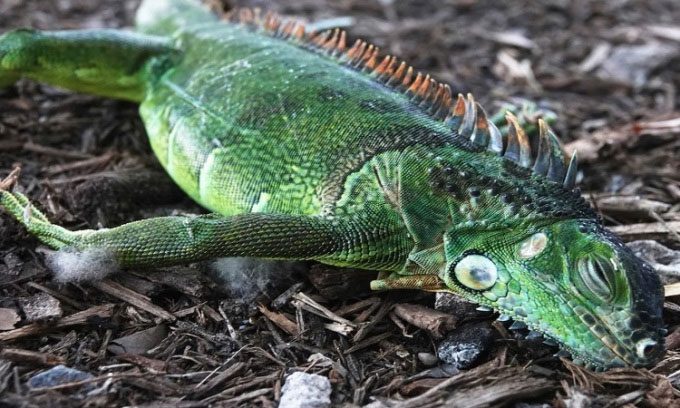Cold-blooded reptiles such as iguanas and sea turtles often become immobilized during prolonged cold weather in the United States.

An iguana immobilized in Oakland Park, Florida on January 22, 2020. (Photo: Joe Cavaretta/AP)
Cold-blooded animals like iguanas can become motionless due to the cold while they are sleeping in trees and fall straight to the ground in South Florida, Washington Post reported on December 22. Similarly, sea turtles can become frozen and wash ashore from Texas to New England. A major storm system bringing snow and cold winds is affecting 90 million Americans.
Experts say that iguanas typically do not die when they fall from trees. Their joints stiffen in the cold, causing them to lose their grip on branches and fall down. Like all cold-blooded animals, iguanas cannot generate their own body heat. They must rely on environmental temperatures to stay warm.
This weekend, temperatures in Florida are expected to drop to 30.2 degrees Fahrenheit (-1.1 degrees Celsius). Many lizard species in the southern part of the state originate from tropical regions, so any temperatures below 45 degrees Fahrenheit (7.2 degrees Celsius) are too cold for them to move. The National Weather Service has previously warned Florida residents about the possibility of iguanas falling from trees. However, researchers have noted that iguanas are adapting to colder temperatures, so the number of individuals falling from trees will be less than in the past.
However, sea turtles cannot adapt well to cold temperatures. In recent years, they have frequently suffered from cold shock off the coast of Texas and other states. Volunteers working with a local rescue organization called Sea Turtle, Inc. rescued over 4,000 stranded sea turtles and relocated them to a rehabilitation area on South Padre Island, Texas in February 2021. Conservation experts are trying to gradually raise their body temperatures by having the turtles rest on tarps and float tanks indoors.


















































